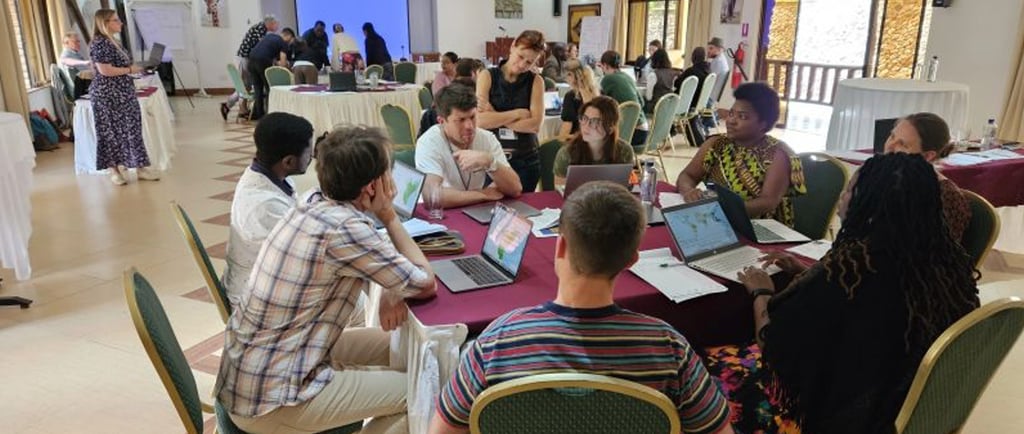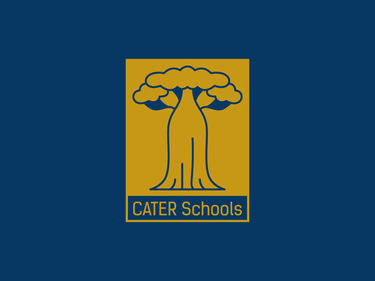Transdisciplinary Multicultural Co-learning and Inclusion in Climate Science
A Personal Experience of Two African Scientists at the CATER School in Naivasha, Kenya


Early career scientists in sub-Saharan Africa face several challenges that limit advancement in careers and contribution to climate services and adaptation. However, as women, we are faced with a unique set of challenges that limit participation related to the work environment, as well as individual and societal factors. International experience/collaboration (or both), disciplinary expertise, and being part of a network of early career researchers and practitioners can enhance engagements with a wide range of actors in climate risk and adaptation. Climate services and adaptation are contextually different in Europe from Africa, but linking science to action remains a common problem. The CATER Schools programme, a planned series of annual schools, with the goal of creating an environment where students, early-career researchers, lecturers, and practitioners across disciplines and sectors can together learn, discuss and re-interpret the latest knowledge at the forefront of climate risk resilience and adaptation in Sub-Saharan Africa, challenges traditional climate services by involving practitioners and users from the start. Here, we share how attending the CATER School in Naivasha, Kenya better equipped us as African women early career scientists in climate adaptation through mutual learning.
The CATER school was held in Africa, and the physical environment, while unique, was relatively familiar to us as Africans, allowing us to get an international experience without having to leave Africa, in a familiar yet unique cultural environment. This also made travelling easier and the course itself was fully funded, addressing the common problem of lack of funding to attend such training held in Europe.
We took a 2-hour scenic drive through the Great Rift Valley to Naivasha in one bus. We predictably sat next to each other and shared our fears and hopes for the school. Will we be relevant, will we interact fruitfully with our European counterparts, senior African scientists and other participants, will this be another fruitless networking effort? We had left our children in the care of others, a difficult decision for most female scientists in Africa.
The environment, often an inhibiting factor in the participation of female early career researchers, was conducive and allowed us to be comfortable. There was an equal number of male and female participants at the school. In addition, there was a fair number of female lecturers too. While this may be normal in Europe, it is often very rare in sub-Saharan Africa due to the low 31.3% representation of women in science and development research in the region. One of us shared our fears and experiences relating to gender discrimination with a European female early career scientist on our first day through stories, she shared her experience too and indicated that while also present in Europe, they have a way of dealing with such issues. Furthermore, advances in Women’s rights have created a safe environment and subsequently enhanced the representation of females in academic and development research including climate services. While Europe has the highest gender parity of all regions, sub-Saharan Africa is the lowest-ranked region in closing the gender gap on Educational Attainment.
The presence of female lecturers, some of whom are mothers like us, immediately provided a safe environment and role models for us. Among the lecturers were African researchers from the Climate Systems Analysis Group (CSAG), at the University of Cape Town, who have an understanding of African settings and experience working within Africa and abroad. Fears of social discrimination as well as prejudices based on academic discipline were immediately indirectly addressed before we arrived at the venue. A casual discussion with one of the female lecturers from CSAG indicated she had an understanding of our fears and maybe our hopes before we could indicate that to her. That immediately made us feel at home and we knew we were heading for a fruitful experience. The conducive environment and composition of participants and staff was the beginning of a fruitful experience.
It was exciting to engage with the reading material two months in advance and have a glimpse of what to expect. By the time we arrived in Naivasha, we knew each other at least from online introductions and profiles. This was interesting as it allowed us to have an idea of each participant and lecturer’s knowledge area beforehand, an activity that proved important in mutual learning and networking without the awkward moments of trying to learn a little something about everyone. This also allowed us to spend time outside the sessions learning from each other rather than about each other. This is often challenging from the position of female scientists as it may carry negative cultural connotations in most African settings. In many workplaces and societies, women may feel hesitant to initiate conversations with their male counterparts due to societal expectations that they be reserved and cautious, as initiating conversation can be misinterpreted as flirtation.
The structure was unique and covered a comprehensive curriculum. There were ten lecturers of different age groups, academic disciplines and geographic origins, a variety that created an environment of minimal learner fatigue. The facilitators and lecturers had extensive expertise in their fields and ensured a valuable learning experience. Several gaps in knowledge, that had manifested during the reading period, were systematically filled through the lectures and practical sections. The diversity of topics and depth provided an interesting intellectual challenge. The active learning methods fostered critical thinking, collaboration, and communication skills. Fellow participants and lecturers were very helpful, sometimes we could meet at flexible times after learning sessions to work on our group assignments. The content was engaging and the comprehensive curriculum answered real questions.
The first thematic session was an engaging topic of climate risks, their drivers and framing and gradually moved to climate predictions, highlighting the challenges and opportunities which are often missed by adaptation scientists and implementation partners. The session moved to an in-depth on climate forecasts and predictions highlighting what they can and cannot tell the user. The session revealed the difficulty in communicating climate model output to a wider audience and how to tailor them to each sector to provide useful information to impact decision-making. We appreciated the wide variety of sources of weather forecasts and their strengths.
The sessions on decision complexity and plurality of knowledge systems opened our eyes to the many ways of knowing and the need for multiple sources of knowledge, and multiple futures, and acknowledged trade-offs and synergies between competing values and priorities. It became clear that for transdisciplinary research and the coproduction of services to work, there is a need to define norms of active engagement of members in theory and practice.
The group practicals during and after the sessions were the beginning of academic collaboration. Playing the role-playing game gave a practical experience in coproduction to understand the challenges involved in engagement, communication and relationship development in practice. It also gave insights into exploring decision-maker requirements and seeing things from a different perspective. As scientists we were able to consider the place of our science in solving complex problems. This was augmented by playing a serious game for crisis management and climate action transdisciplinarity which drew attention to the cross-sectoral cooperation needed in responding to complicated cascading hazards that are cross-cutting in nature. These and other activities brought to life the complexities discussed in the sessions while the dynamics in the discussion sections presented an enriching experience.
Our highlight of the training was in creating a serious game in groups. This was a process of transdisciplinary coproduction in teams specifically created for the activity. We spent about 10 hours designing a serious game from scratch. The diversity in academic disciplinary background, diversity in current roles, and cultural backgrounds made the kick-off difficult, highlighting the difficulty. We were co-producing and it was clear that despite the many benefits of transdisciplinarity and coproduction the practice is difficult and requires integrating multiple methods, building trust, ensuring quality, and evaluation. Some of the particular challenges involved understanding and appreciating the different ways of knowing among the group members and how it is influenced by gender, academic and cultural background, and lived experiences among other factors. We practically went through the classic stages of group development and eventually built trust and created amazing serious games.
The module on power, ethics, and social justice took us deeper into the political ecology, climate politics and action. Together, we closed the thematic sessions by developing a CATER School 2023 Climate Services "Pledge" based on our experience at the school and how we would like to conduct ourselves from here going forward.
The game group experience, the modules, the mutual interactions with each other, collaboration and informal mentoring transformed us before we went through a session on professional development and progress, building a profile, publishing and bidding for projects. From individual research presentations, we learned about each other’s research and the diverse activities in climate services research. Through the various presentations, the importance of effective visualizations in the dissemination of research results was evident.
In attending the CATER school, despite our fears, we hoped to enhance our skills in climate adaptation and climate services research. This objective was met and exceeded as we gained in-depth knowledge of each topic. In addition, we hoped to network and learn from fellow participants and staff while bringing perspectives and knowledge informed by our context. Through the CATER school, we gained valuable networks and skills such as research skills, communication and collaboration skills, analytic skills and reporting skills. By the end of the school, we were each familiar with each other, our research as well as our academic disciplines and competencies, an important step towards future collaborations and maintaining networks.
We had an exciting, fruitful experience and effortless learning. The methods of teaching were unique, for instance, we had one session on transdisciplinarity yet the process was embedded in everything else fostering practical learning. Team building and trust creation were not only discussed in the sessions but also experienced throughout the school. The benefits were realized through the group game activities and the leisure activities. From the CATER school experience, transformation was gradual over the days leaving us feeling more empowered, bolder and more prepared to take up our roles as early career female scientists for our career advancement towards the betterment of Africa, and the world.
In this light, we would recommend other female scientists and African scientists in general in the climate services and adaptation space to take advantage of such opportunities as stepping stones to career advancement. This can contribute towards addressing gender disparity and fostering equity as well as promote more inclusive and effective approaches to climate change adaptation in agriculture and development. The involvement of scientists from developed research groups both in Africa and Europe in training early-career female scientists enhances learning. Initiatives like the CATER school in addition to their discipline objectives, help early career scientists through mentoring, funding, capacity building, motivation, and role modelling, they could perhaps share their methods with other trainers to enhance climate service provision and training in African settings.
About the authors: Sinikiwe Dube is a research associate in the Faculty of Earth & Environmental Sciences, Marondera University of Agricultural Sciences and Technology, Zimbabwe. Hilda Kabuli is a statistician in the Department of Agricultural Research Services, Lilongwe, Malawi. Both took part in the 2023 CATER school.
A typical scene from the 2023 CATER school showing groups preparing advisories for different sectors based on the seasonal forecast for the East African short rains, in Naivasha, Kenya. The authors are both seen in the picture, sitting at the closest table: Sinikiwe is no. 3 from the right and Hilda is sitting closest to the camera on the right.
